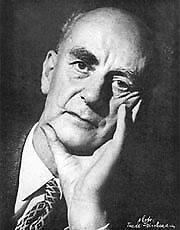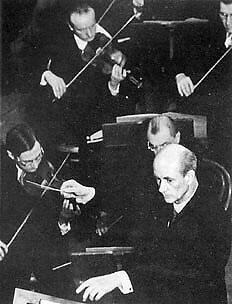Great Performers - Wilhelm Furtwängler by Philip Anson and Wah Keung Chan
/ February 1, 1998
 A glance at
the library bookshelves reveals a dozen books written about German
Maestro Wilhelm Furtwängler over the last decade to coincide with
the 100th anniversary of his birth and the fortieth anniversary of
his death. The current obsession with the role of art and culture in
the Third Reich has also focussed attention on Furtwängler, who was
Hitler's favourite conductor. Last summer I had the good fortune to
interview Wilhelm Furtwängler's step-daughter Kathrin during her
visit to Montreal. Kathrin was a little girl when her mother
Elizabeth married the great Maestro. She was glad to talk about the
growing public fascination with Furtwängler and to share her
memories of their family life in Germany and Switzerland during the
last decade of Furtwängler's life. A glance at
the library bookshelves reveals a dozen books written about German
Maestro Wilhelm Furtwängler over the last decade to coincide with
the 100th anniversary of his birth and the fortieth anniversary of
his death. The current obsession with the role of art and culture in
the Third Reich has also focussed attention on Furtwängler, who was
Hitler's favourite conductor. Last summer I had the good fortune to
interview Wilhelm Furtwängler's step-daughter Kathrin during her
visit to Montreal. Kathrin was a little girl when her mother
Elizabeth married the great Maestro. She was glad to talk about the
growing public fascination with Furtwängler and to share her
memories of their family life in Germany and Switzerland during the
last decade of Furtwängler's life.
Wilhelm Furtwängler was born on January 25,
1886, in Berlin, the oldest of four children and the only one to
become a musician. His father Adolf was a well-known classical
archaeologist and his mother Adelheid was a painter. The boy's
musical talents were evident early: he started piano lessons at age
4 and penned his first composition at age 7.
Furtwängler's earliest ambition was to become a
composer. He started conducting just to earn a living. He never
played in an orchestra, but learned the ropes as a rehearsal
pianist. His father helped arrange a concert for him in 1907 -
Bruckner's Ninth Symphony with Munich's
Kaim Orchestra - which was his first big success. A 1912 concert
conducted by the great Artur Nikisch in Hamburg stimulated
Furtwängler's ambition to become the best conductor of his
generation. He soon became known and attracted a loyal
following.
An engagement with the Mannheim orchestra
led to his appointment as director of the Berlin Philharmonic.
Through the 1920s and 30s Furtwängler was considered the foremost
conductor of his time and it is interesting to learn that even his
children were in awe of him. "Looking back I can say he is the
greatest person I've ever met. We all knew that, even as children,"
recalls his step-daughter.
Wilhelm was a good father, loved to laugh
and tell jokes to his children. "The thing I remember best is that
when he played with us he played to win. Some grown ups, when they
play with children let them win, but my father's way was much more
fun." Another anecdote reveals Furtwängler's legendary
competitiveness. One morning her father described a terrible
nightmare he had: "I dreamed I was in a race and I came in
second."
Furtwängler's work ethic was strong. "Goethe
said that genius is 99% perspiration and 1% inspiration, which
certainly applies to my father. He had great powers of
concentration. He could sit and memorize a score without being
bothered by all the children making noise around him." She recalls
how he went for a walk every day, following the same circuit for
hours. "He didn't look at nature. He was probably still thinking
about work."
Kathrin also recalls spending her school
vacation in Salzburg where her step-father was  conducting Verdi's
Otello. "They rehearsed a lot more than they do today. We
stood the whole day in the rehearsals and I cried every time Otello
entered Desdemona's room to kill her." She also recalls that at
first he didn't want to do Otello but after it was over he decided it
was a good opera. "He could always find something valuable in the
music." conducting Verdi's
Otello. "They rehearsed a lot more than they do today. We
stood the whole day in the rehearsals and I cried every time Otello
entered Desdemona's room to kill her." She also recalls that at
first he didn't want to do Otello but after it was over he decided it
was a good opera. "He could always find something valuable in the
music."
Furtwängler's fame reached its height during
the Nazi years. His work brought him into close personal contact
with high Nazi party officials, including Goebbels, Göring and
Hitler. The notorious film footage of Furtwängler shaking Hitler's
hand after a concert has done his reputation great harm. Kathrin
tells the story of that event: "That Nuremberg concert was supposed
to be on Hitler's birthday, so my father scheduled it the day
before, thinking Hitler would not attend. He was so furious when
Hitler came to the concert that he pulled a radiator off the wall.
Furtwängler came on the stage and told his musicians to begin right
away. But after the concert, Hitler gave him his hand and he had to
shake it. If you don't know the story, then it is easy to get the
wrong idea from the photo."
Furtwängler was never a Nazi party member,
but he enjoyed official favour, honours, and earned more money than
any other German musician of his day. Endless books and articles
have been written about Furtwängler's involvement in the musical
life of the Third Reich. Katrin describes Wilhelm as a political
innocent who thought he could do good by staying in Germany. "He
stayed in Germany to give the people the gift of his music. He was
very German, his roots were there and he would have suffered in
exile. What was important for him was German culture. No other
conductor knew more about German literature and painting. It was not
just the music, he wanted the whole culture around him."
Whether Furtwängler was a Nazi is still hotly
debated. Michael Kater in his book The Twisted Muse: Musicians
and Their Music in the Third Reich (Oxford University Press, 1997 p.201) claims that he was, while
(as other writers before him) offering examples of people who were
helped by Furtwängler. In any case, Furtwängler was used by the
Nazis and used them in return. He was denazified in 1947, and the
transcripts have become the basis for Ronald Harwood's play "Taking
Sides," which makes its Canadian debut at Montreal's Centaur Theatre
in February 1998.
Furtwängler's final years were unhappy. In
1952, a course of the antibiotic streptomycin damaged the nerves in
his ears, leaving him deaf. Attempts to compensate for his hearing
loss with onstage loudspeakers were ineffective. In 1954 he
conducted his last concert and died after another bout of pneumonia.
Considering how her father dreaded growing old (he always avoided
the local old folks' home) Kathrin considers his death an act of
mercy. "He certainly didn't want to become a useless old man."
Furtwängler's conducting style can be
studied on several commercially available videos (including Teldec's
"The Art of Conducting" series and the Bel Canto Society's "Great
Conductors of the Third Reich"). He leads his orchestras with a
magisterial intensity, with expressive hand movements but a
strangely stiff back. His daughter explains that this was not a case
of nervousness, "My father was the most relaxed person I've ever
seen. People always remarked on the elegance of his conducting,
especially his graceful turning, but this was partly the result of a
skiing accident. He hurt his neck, so he couldn't turn his head
alone. "
Furtwängler made relatively few recordings in
his lifetime, mostly for EMI, but a wealth of excellent pirate
recordings exist from live broadcasts of the 1930s and the post war
era (a comprehensive discography is available on the internet at the
Website http://www.fornax.hu/wfsh/disco.html ). He
left behind several compositions which he asked his wife not to
promote, hoping they would be appreciated on their own merits. He
wrote several essays on music and conducting. In a letter to La
Scena Musicale Furtwängler's widow
Elisabeth (the English translation of her biography of her husband
was published last year by the Furtwängler Society) declares herself
pleased by the growing interest in her late husband's music and
writings "not only among younger people who know him only from
records, but also among the younger generation of conductors who are
emulating his example in their own work, especially Sir Simon
Rattle, Esa Pekka-Salonen and Christian Thielemann. It might not be
too much to say that Furtwängler is becoming better understood now
than in his own lifetime. There is a splendid irony in that."
Taking Sides opens
at the Centaur Theatre in Montreal on February 24. Info:
(514)288-3161.
In a future issue,
we will look at the music of Furtwängler.
| 

